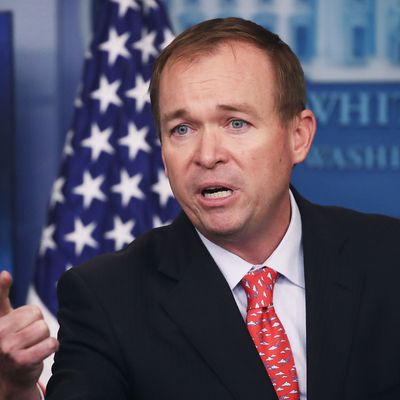
There seem to be five steps to Donald Trump’s plan for draining the swamp of D.C. corruption:
1. Sign an executive order prohibiting all lobbyists and industry lawyers hired as political appointees from working on issues that involve their former clients.
2. Appoint many lobbyists and industry lawyers to political positions throughout the federal government.
3. Grant many of these lobbyists special waivers that allow them to work on issues that involve their former clients.
4. Refuse to publicly disclose which lobbyists received such waivers, in unprecedented defiance of an Office of Government Ethics request.
5. Argue that the federal government’s ethics watchdog doesn’t actually have the authority to police the administration’s ethics.
The White House took those final two steps last week, as the New York Times reports:
The Trump administration, in a significant escalation of its clash with the government’s top ethics watchdog, has moved to block an effort to disclose any ethics waivers granted to former lobbyists who now work in the White House or federal agencies.
The latest conflict came in recent days when the White House, in a highly unusual move, sent a letter to Walter M. Shaub Jr., the head of the Office of Government Ethics, asking him to withdraw a request he had sent to every federal agency for copies of the waivers. In the letter, the administration challenged his legal authority to demand the information.
… “It is an extraordinary thing,” Mr. Shaub said of the White House request. “I have never seen anything like it.”
Marilyn L. Glynn, who served as general counsel and acting director of the agency during the George W. Bush administration, called the move by the Trump White House “unprecedented and extremely troubling.”
“It challenges the very authority of the director of the agency and his ability to carry out the functions of the office,” she said.
Glynn ain’t kidding — the White House’s actions are radical and unprecedented.
The Obama administration did allow some ex-lobbyists to flout its own, very similar ethics rule. But any time the administration provided such a waiver, it automatically published a detailed explanation as to why an exception was being made. These justifications typically cited the unique skill set of the individual in question, and/or the fact that the individual’s new responsibilities would only bring her into peripheral contact with her former employer’s interests.
Trump, by contrast, has put many former lobbyists in charge of regulating the industries they used to work for, while offering no public explanation of how those appointments comport with his own ethics rule. Then, when the Office of Government Ethics asked questions about this arrangement, the administration effectively challenged that office’s legal authority to oversee government ethics.
The OGE had asked all federal agencies (including the White House) to provide a copy of every ethics waiver they’ve issued by June 1. The office has clear legal authority to request such information. In fact, “data requests” are OGE’s primary tool for providing ethical oversight.
And yet, the office does not have the power to take enforcement actions against agencies that refuse to honor its requests. Which is to say: The OGE’s capacity to police federal ethics is ultimately dependent on norms of cooperation, not legal powers.
And the Trump administration has little use for norms.
“This data call appears to raise legal questions regarding the scope of O.G.E.’s authorities,” Trump’s director of the Office of Management and Budget Mick Mulvaney wrote in a letter to Shaub. “I therefore request that you stay the data call until these questions are resolved.”
The administration defended this letter in a statement Sunday evening.
“This request, in both its expansive scope and breathless timetable, demanded that we seek further legal guidance,” the statement said. “The very fact that this internal discussion was leaked implies that the data being sought is not being collected to satisfy our mutual high standard of ethics.”
The Trump administration has been feuding with the OGE since late November, when Shaub began publicly urging the president-elect to sell off his real-estate assets.
But now, the White House is disputing the office’s legal right to perform the oversight that it was created to provide.
Seems unethical.






























